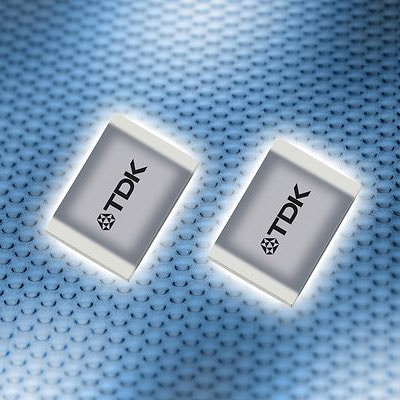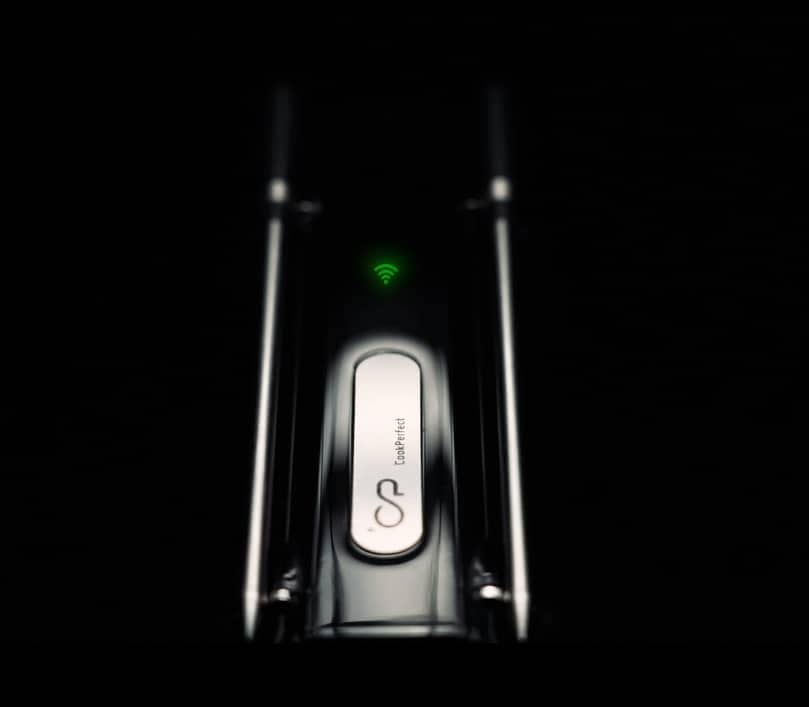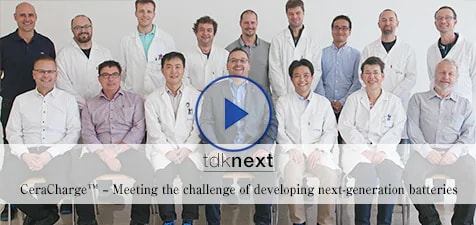

Chip-Sized Solid-State Battery Opens Door to New IoT Era
Solid-state batteries, an alternative to rechargeable lithium-ion batteries widely in use today, are undergoing intense development all around the world. These next-generation batteries are based on solid electrolyte material instead of liquid electrolytes, promising far superior safety and reliability, as well as longer lifespans. In 2020, TDK successfully commercialized the world’s first all-ceramic, solid-state SMD*1 battery, CeraCharge®. Furthermore, in 2024, the company successfully developed a new solid-state battery material with an energy density approximately 100 times greater than conventional products. Development is ongoing for batteries that can replace the existing coin cell batteries found in wireless earphones, hearing aids, smartwatches, and other wearable devices.
Solid-state batteries: The next-generation solution that overcomes the challenges of conventional lithium-ion batteries
In the IoT era—where almost everything is connected to the Internet—it’s no exaggeration to say that the key to full-scale adoption lies not only in miniaturization and better connectivity but in battery performance. Lithium-ion batteries, which feature high energy density, are commonly used in various electronic devices like laptops, smartphones and wireless earphones today, and increasingly so in drones, electric bikes and EVs (electric vehicles). However, because lithium-ion batteries are made with flammable, organic-solvent electrolytes, which carry the risk of leakage and fire, IoT device makers have long been asking for safer, more reliable batteries based on stable, solid-state electrolyte materials. The battery market is expected to grow exponentially, as large-capacity batteries like those for EVs are also likely to be eventually replaced by solid-state batteries.
Global market share of solid-state batteries by application
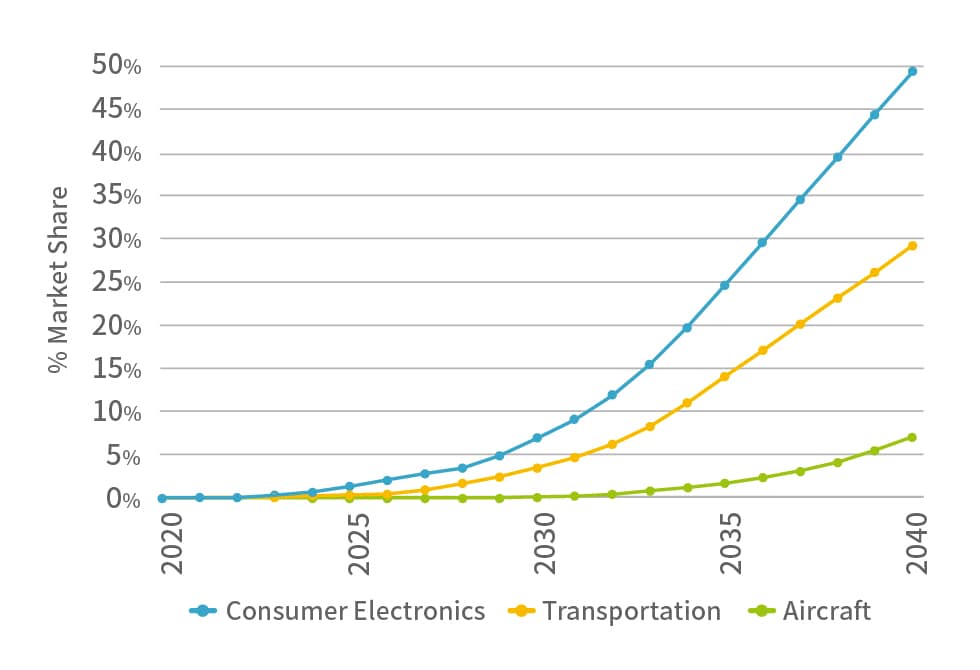
Source: Created by TDK based on data from The Faraday Institution and various Internet sources
Conventional lithium-ion batteries vs. solid-state lithium-ion batteries
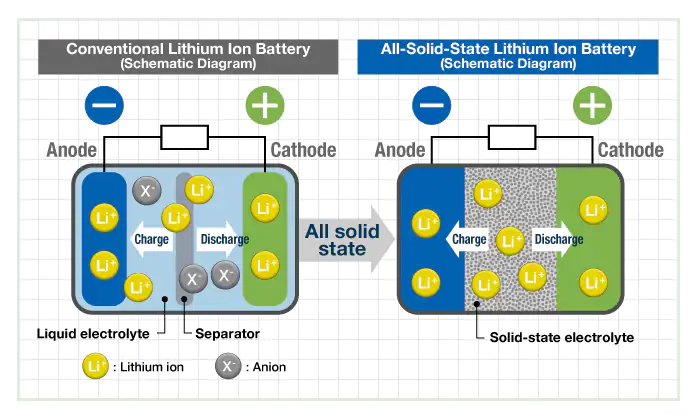
Highlights of CeraCharge, the solid-state SMD battery pioneered by TDK
Amid the global race to develop solid-state batteries, TDK successfully created the world’s first solid-state SMD (Surface Mount Device)*1 battery, CeraCharge, in 2020. CeraCharge was developed based on TDK’s advanced multilayer ceramic technologies and is notable for its suitability for mass production. Its solid ceramic electrolyte eliminates the risk of leakage and fire, while other practical properties include: 4.5 mm by 3.2 mm by 1.1 mm in size, a rated voltage of 1.5 V, a capacity of 100 μAh, and an operating temperature range of -20˚C to 80˚C. What’s more, in 2024, TDK succeeded in designing and developing a new material for solid-state batteries with a substantially higher energy density than current products by leveraging the company’s long-standing expertise in materials development and by adopting an oxide-based solid electrolyte and lithium alloy anodes.
Additionally, CeraCharge’s SMD packaging facilitates battery placement, helping keep assembly costs down. Its advantages in size, safety and lifespan offer great potential for implementation in IoT devices to be used in a variety of settings.
Cross section of CeraCharge® solid-state battery (schematic diagram)
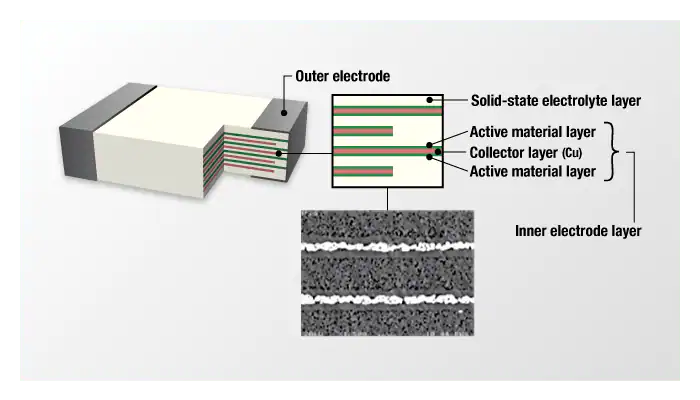
Inaugural application: Cooking thermometers
CeraCharge, a safe, chip-sized solid-state battery, has been working its way into a wide range of IoT products. One such application is a cooking thermometer from Danish company CookPerfect. The device is a 15 cm metal thermometer probe with five temperature sensors, a BLE (Bluetooth Low Energy)*2 communication module, and TDK’s CeraCharge. The internal temperature of meat cooking inside an oven can be checked in real time using a smartphone by simply inserting the probe. This breakthrough product enables anyone to cook challenging, large blocks of meat like Christmas dinner roasts at perfect temperatures.
Martin Kloster, Co-Founder and Managing Director of CookPerfect, discussed the product and its development process. “When we began designing CookPerfect in 2016, battery technology that would allow measuring at five positions, run complex algorithms, and small enough to be built into the unit was simply unavailable. But with CeraCharge, we were able to create the first ‘true wireless’ thermometer.” Kloster stressed the importance of reliability and safety, as these thermometers are inserted directly into food and used in high-heat ovens and grills. “There must never be any chemical leakage. We also needed a high operating temperature range that could tolerate usage inside ovens. CeraCharge has no leakage risk due to its solid form, is small enough to be installed into a 3.7 mm-diameter unit, and can withstand up to 85 ˚C—these were were major factors in our decision to employ it in our product.”
CookPerfect’s wireless meat thermometer

(Photo provided by CookPerfect)
A full-fledged IoT society is on the horizon as devices with various sensors—like this cooking thermometer combining temperature sensors with communication capabilities—continue to proliferate. Along with the growing need for batteries in diverse sizes and specifications, CeraCharge is currently being considered for integration into a wide variety of devices, including real-time clocks (RTC)*3 for smart meters and smart sensors. Solid-state batteries are also ideal for wearable devices worn directly on the body, as they feature excellent thermal stability.
Coin cell batteries—most of which are disposed of today—are gradually expected to be replaced by rechargeable types, and solid-state versions are anticipated. TDK, the first in the world to commercialize solid-state batteries, continues to work on expanding its lineup of products with increased miniaturization and capacities to cover a broader range of applications. CeraCharge will continue to empower the rapidly expanding IoT market.
CeraCharge® solid-state battery
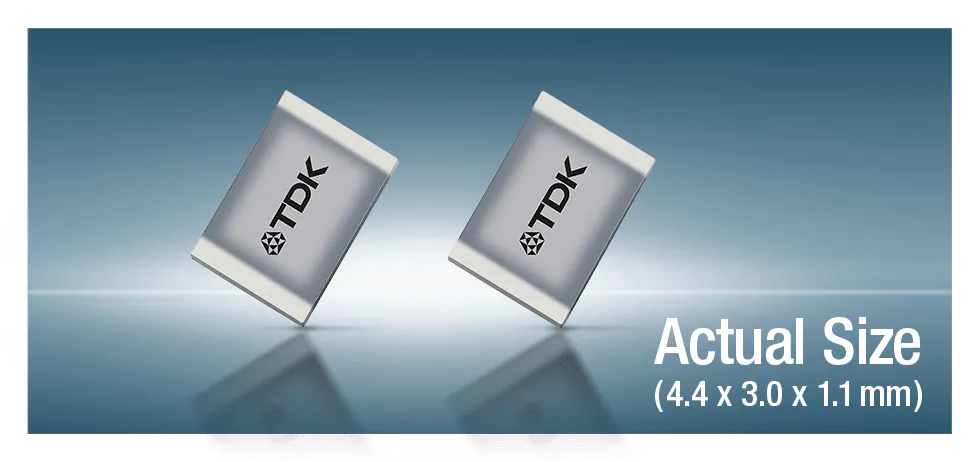
For more information, please visit our Product Center.
Terminology
- Surface Mount Device (SMD): An electronic component mounted directly on the surface of a printed circuit board using solder. This method uses less space compared to mounting components with leads on a printed circuit board with holes, enabling the miniaturization of devices.
- BLE (Bluetooth Low Energy): A part of the Bluetooth standard, the short-range wireless communication technology. Because of its low power consumption and low cost, it is attracting attention as a communication technology for use in IoT devices.
- Real Time Clock (RTC): A circuit embedded in a computer or device that continuously measures the passage of time even when the system is powered off.















